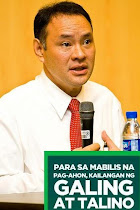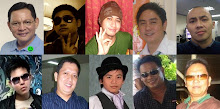ROBIN SEBOLINO, wrote an article entitled "ON GILBERT TEODORO"
I accidentally watched a presidential policy forum earlier this morning and I was particularly intrigued by a great irony happening this Philippine election season. And this is, the supposed smartest people in the country, i.e., students, are the ones being duped the most by empty words. This is not to discredit the power of rhetoric. Ever since James Cameroon's The Avatar enlightened me about the power of technique--CGI, visual effects, etc., or those what I call rhetoric of cinema-- I've learn to acknowledge the importance of "how to say things," which for the longest I have been wrongly struggling to escape in the name of raw content and message.
I want to give Mr. Teodoro his due. He speaks excellently. He perhaps has the best speechifying ability among all candidates for the Philippine Presidential Elections 2010. Add to that his looks and the beauty of his wife--I don't know about his kid--and you will have a man in with impressive image and physical form suitable for a leader.
There is nothing wrong with falling for spectacle, in show business and art at least. But in choosing a person who will have to do serious job, that is, voting for the right president, there can be no excuse about making a decision based on form only. Needless to say, there has to be substance as well.
Since it has been established that Mr. Teodoro speaks nicely, let us assume that the way he phrased his answers in the issues of economy, education, and corruption are done elegantly. So I beg your pardon if I do not give justice to his rhetoric. Having said that, I will not attempt to sound like him. Nevertheless, correct me if I miss something.
When he was asked about increasing investments, his mouth quickly spitted shibboleths or magic words to subtly remind us that he had a Harvard Diploma. He mentioned infrastructure, job security, and bilateral trade agreements. I waited for an explanation how he planned to acquire such requirements to boost the country's economy, but I only got frustrated. This doesn't mean that we have to expect him to explain his economic blueprint in detail; it is for his bureaucrats to do. But at least his should give an overview--perhaps the common and recurring fiscal problems and some proven ways to address them--so as not to sound like an annoying know-it-all in class. He simply sounded like a better version of Mr. Villar because he knew economic terminologies. He did not say connect SLEX to NLEX, or better yet C5. Rather he mentioned big words, which even your economics professor can sometimes speak about eloquently, yet you might not vote him for president.
Then he talked about education, in particular the medium of instruction: the choice of English. This was where Mr. Teodoro had shown his dynamism. He used what I want to call, "instinctive theorizing." He said, English should be taught in primary, because teaching it in the elementary might be too late... The problem in his statement is easily spotted; studies show otherwise. The Leeds experiment, for instance, showed that when English was once taught in France in the primary level, the "eventual outcome in 1974 were rather disappointing." (Howatt and Widdowson 2004) English is taught in 1st grade in Sweden--NOT in primary level-- and the results were better. I bet a lot of people were convinced by his stand. It should not be a surprise because Mr. Teodoro knows how to speak common sense. And common sense, although basic and important, isn't always what a country needs. Abraham Lincoln could have followed his common sense and advocated slavery to guarantee the unity of the United States and prevent a civil war. But he chose the less intuitive abolition and did something phenomenal. Mr. Teodoro needs to do better. He barely has this kind of substance.
Here's my favorite part: corruption. In the Philippine context, corruption is often associated with justice because it where the country lacks the most. Every attempt to try an allegedly malevolent leader (the president) was blocked by the congress. Nobody likes to have a trial, perhaps because politicians doubt their own personal fairness, but that is besides the point. The idea is that when there is a probability of crime having committed, there has to be trial. Mr. Teodoro overlooks this issue and it's unbecoming of a lawyer. Instead, when he answered the question of corruption, his answer, as usual evaded justice. With conviction, he talked about incentives so as public officials would not become thieves. While his response is valid and gives a valuable insight, it fails to address the essence of every corruption related question in the country:"What are you going to do to those who have committed and are currently committing crime with impunity?" Everyone should be skeptic of Mr. Teodoro on this issue for based on his past decisions, he doesn't seem to have very good values. In congress he voted against the impeachment of Pres. Joseph Estrada, but signed for the impeachment of Chief Justice Hilario Davide. He defends President Arroyo with all might, exhausting every bit of La Sallian education in his blood, and implicitly dismissed the common man's wisdom--which is a valid basis for determining guilt (Jurist System)-- that GMA cheated in the last elections. This man loves presidents and it isn't a surprise that he wants to become one too.
Beneath his rich vocabulary, Mr. Teodoro apparently lacks good substance. He might be nice to the ears or pleasant to the eyes, but if he is supposed to feed the mind and the soul, he is hardly nutritious. He's actually like an oily suckling pig. When you're old and mature, you'll know that he's gonna clog your arteries and be the cause of your death someday. But when you're young and all you care about is being cool and popular, you gonna buy him and indulge in all his fat.
------------------------------------------------
------------------------------------------------
------------------------------------------------
------------------------------------------------
This is AARON BENEDICT DE LEON's RESPONSE TO HIS CLAIMS...
On the Economy:
Of course, before you can enact your specific fiscal or monetary measures in terms of balancing your economic strategies, the pre-existing conditions towards entry must first be met, for without creating a conducive atmosphere for investment, it will be useless to create specifics since stakeholders are not willing to engage.
Investment is an independent function of infrastructure, human capital and global cooperation. Please be reminded too, since I was physically present there, that each candidate was only given 1-2 minutes to elaborate on the questions.
Going back to the case and point, of course you will have a set of macro-economic tools like expansionary and retractionary fiscal policies that you can use, but UNLESS you guarantee that the Philippines is a haven for investment, any drive towards enacting these specifics would be futile if investors are not willing to engage.
In fact, the ROSTOW's STAGES OF GROWTH continues to be the standard measure of a country's economic performance, and the country is still at the stage of pre-conditions for take-off. Now, before WE can go to specifics, the pre-existing conditions for investment have to be met first.
On Education:
I personally feel that the Educational system here in the Philippines should be compared BASED on the similarities of its topography, cultural diversity and the students' learning curve WITH another country, and I don't think making a comparison with a study in France suffices that. Remember that the topographical characteristics, the cultural and ethnic diversity of our country must be taken into consideration, and also the learning curve of our students. Sec. Teodoro's reaction was based on a status quo, where education of English comes at a later stage of primary education, was not working, so he is spousing an alternative means of reintroducing English in early primary education. As I say, No One size fits all, even if you have that statistic to show for.
On corruption:
The stereotypical answer would have been to enforce the full teeth of the law, which has been a common answer for years now. Now, known to have education on crime prevention, the first thing you have to do in these situations is to DETER nuisances to corruption, so that now, you can corner the corrupt people and find who the culprits are. That's why you will also need to put a balance to at least provide incentives to those who have stayed honest in government, because it is a primary alternative deterrence to corruption. Again, it does not guarantee that corruption will be eliminated, but as economics says, people respond to incentives. We need to balance our thinking when it comes to corruption. I think the punishment and all that has been echoed upon too much, and its a matter of reforming or realigning your institutional systems so that you can at least lessen it, which Sec. Teodoro has expounded in previous speaking engagements.
I think Robin one forum is not enough for you to gauge Sec. Teodoro, that's why its a series of forums that media organizations are putting together, because no one forum can measure the flexibility of a President in terms of different issues.







0 comments:
Post a Comment